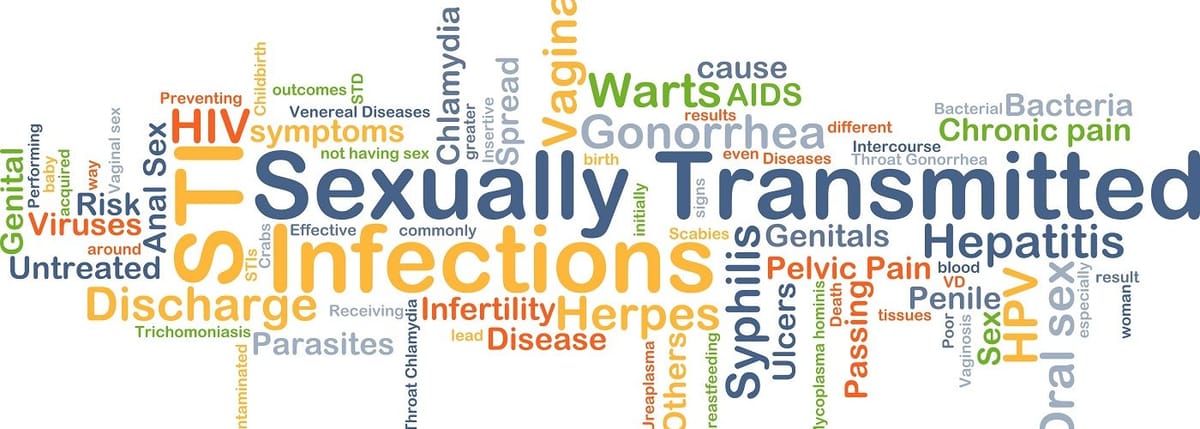
Sexually transmitted diseases can have an impact not only on your general health and of course your sex life. But they can also affect your future fertility. Anyone who is sexually active needs to be aware of what sexually transmitted diseases are, and how best to avoid them.
In our blog article, we set out a sexually transmitted diseases list, so you can be aware of the wide possible range. We also take a look at how the various types of sexually transmitted diseases are transmitted, how they are diagnosed and treated, and how this may affect both men and women (even if the symptoms are not the same).
What are sexually transmitted diseases (STDs)?
Any disease that is passed from one individual to another through sexual contact is known as a sexually transmitted disease or STD. Sometimes these conditions are known as STIs (sexually transmitted infections) or venereal diseases. These diseases tend to be transmitted through any sort of penetrative sex or genital contact, through the contact of bodily fluids, sometimes through skin-to-skin contact. Some STDs can be very serious if they are not treated quickly, while others can easily be cleared up.
The full sexually transmitted diseases list would be quite long, but here are the most commonly occurring types of infection:
Bacterial infections
- Chlamydia, the most common STD worldwide.
- Gonorrhoea, which used to be referred to as ‘the clap’.
Viral infections
- Herpes, which results from the herpes simplex virus.
- HIV, a virus which attacks the immune cells.
- Human papillomavirus (HPV), a virus which can cause genital warts or changes to the cells of the cervix.
Parasitic infections
- Pubic lice, also known as ‘crabs’ are small insects which, like head lice, feed on human blood.
- Trichomoniasis is caused by a tiny parasite, the Trichomonas vaginalis (TV).
How to protect yourself from STDs
The only certain way to avoid STDs is to always take precautions.
- Condoms, as long as they are used properly, provide effective protection against some STDs. For maximum protection, condoms should be used during vaginal, anal or oral sex. They are generally effective for preventing any infection that is passed on through fluids such as semen or blood, but they are not fully effective for preventing the sort of infection that can result from skin-to-skin contact.
- Regular screening for STDs is good practice for anyone who is sexually active, especially when you change partner or have a new sexual contact. Since some STDs do not show symptoms, even though they are easily passed on, screening is the only way to find out for sure.
- If you do test positive, it’s important to get treatment as soon as possible, and to follow your healthcare or specialist clinic’s treatment plan.
- It’s also vital that you act responsibly in sharing the information with any sexual partners so that they are able to take appropriate action and stop the infection from spreading any further.
Symptoms, diagnosis and treatment of STDs
Since symptoms, how STDs are diagnosed and how they are treated vary according to the type of infection, it is important to get individual attention from an appropriate clinic or healthcare setting.
STD symptoms
Symptoms can appear within a few days or weeks of infection taking place, but in some cases, they do not appear for months or even years. There are often no symptoms at all and you may not know you have an infection. For example, chlamydia is the most common STD in Europe, with over 3 million cases between 2004 and 2013. However, there are often no symptoms, or they can be mild and pass quickly. When symptoms do occur, they can include a discharge from the vagina or penis, painful urination and lower abdominal pain.
Diagnosis of STDs
In the majority of cases, your doctor will not be able to diagnose STDs based only on symptoms (which may in any case be absent) and will need to do some tests. These could take the form of urine and blood tests, and possibly a genital swab.
STD treatments
Treatments vary according to the diagnosis. Bacterial STDs can usually be treated simply and successfully with antibiotics. Most viral infections on the other hand are not curable. Sometimes they clear spontaneously but if not, they can be mitigated and controlled with medication. In particular, antiretroviral treatment can halt any progression of HIV and reduce your risk of transmitting it to a sexual partner. Other STDs such as lice and trichomoniasis are normally treated with topical or oral medications.
How can STDs affect future fertility?
There are a number of ways in which sexually transmitted diseases can have a longer-term impact on fertility for men and women.
- Chlamydia and Gonorrhoea are two of the major causes of infertility in Europe and worldwide because they can cause pelvic inflammatory disease (PID). This may result in scarring or blockage of one or both fallopian tubes with the result that a woman can be effectively infertile, even though she is ovulating normally, as the egg cannot travel down the fallopian tube to meet a sperm. This can be treated with in vitro fertilisation, because in IVF the eggs are collected directly from the ovaries, bypassing the fallopian tubes.
- In men, Chlamydia and Gonorrhoea can cause a blockage of the epididymal tubes and render them effectively infertile if left untreated.
- HIV can decrease fertility in women by causing a lack of ovulation. For women who do become pregnant, complications are more likely if the patient is not taking antiretroviral medication. For men, sperm function can be affected by HIV, and they can also experience a decrease in libido as well as erectile or ejaculatory dysfunction. In the case of a male partner being HIV positive and the female partner being HIV negative, a technique known as sperm washing, which we offer at our IVI clinics, can ensure that the virus is not passed on to any offspring.
Contacting us at IVI
We know it can be difficult to deal with the challenges of sexually transmitted diseases, but do remember that the sooner you take action, the better. In the short term, getting checks and treatment when necessary will minimise any potential negative outcomes. In the longer term, if you have any concerns about the impact of STDs on your fertility, do get in touch with us at IVI.





Comments are closed here.